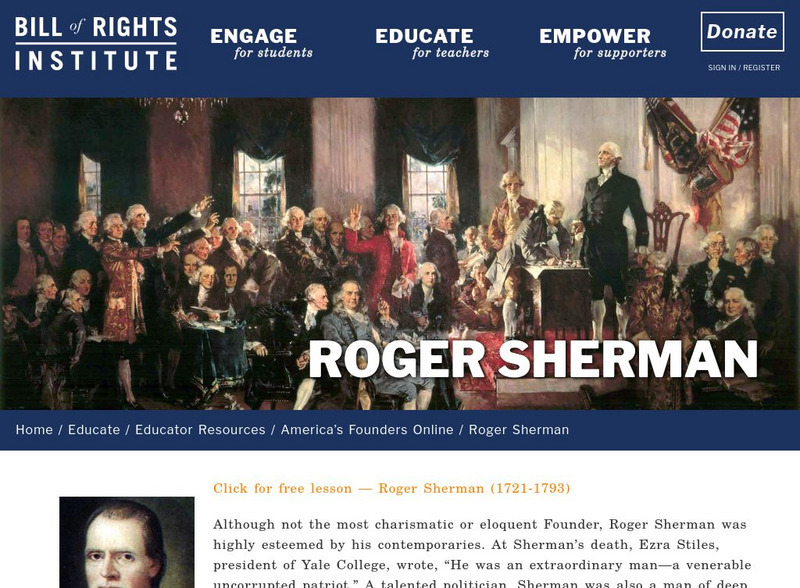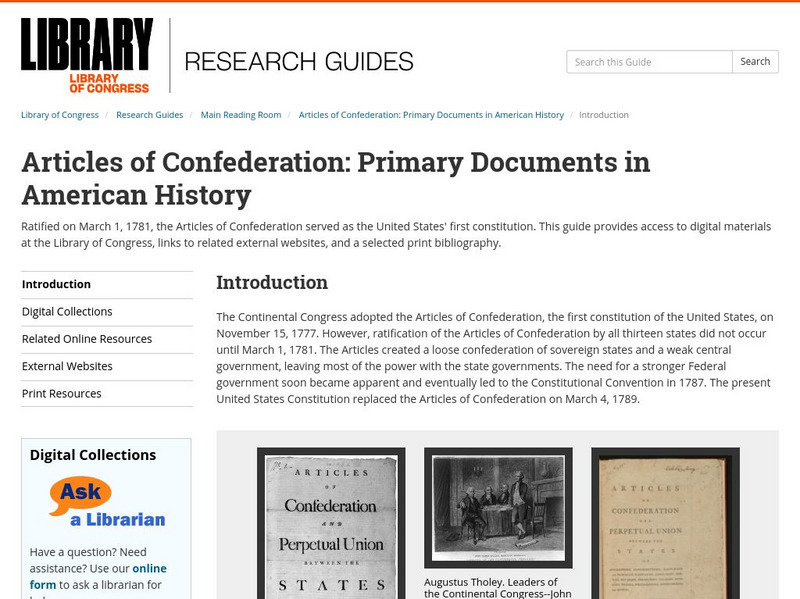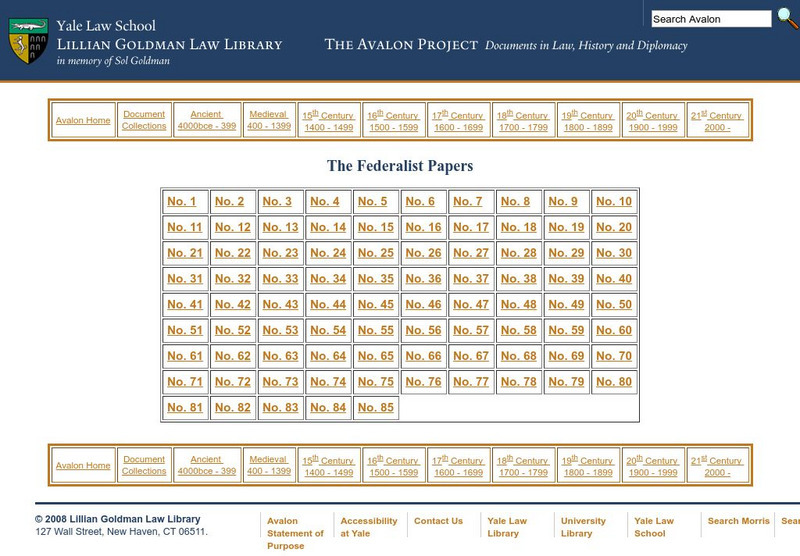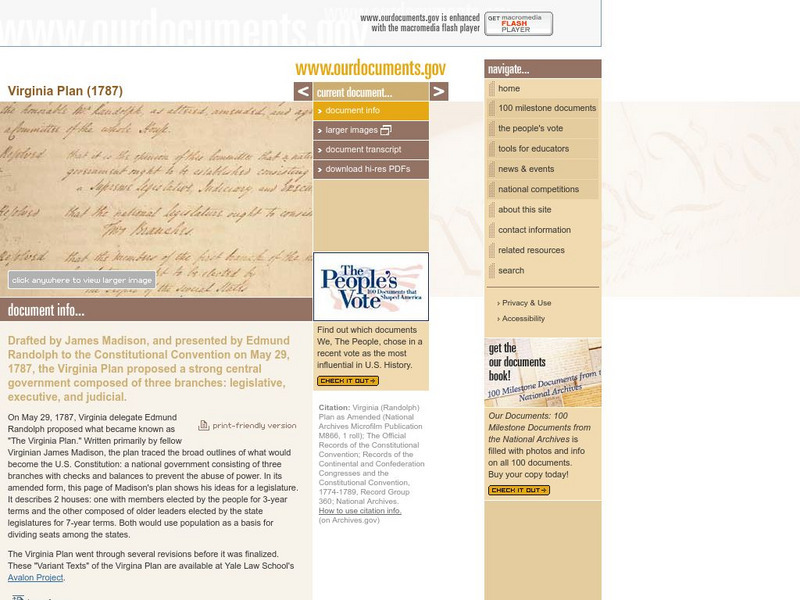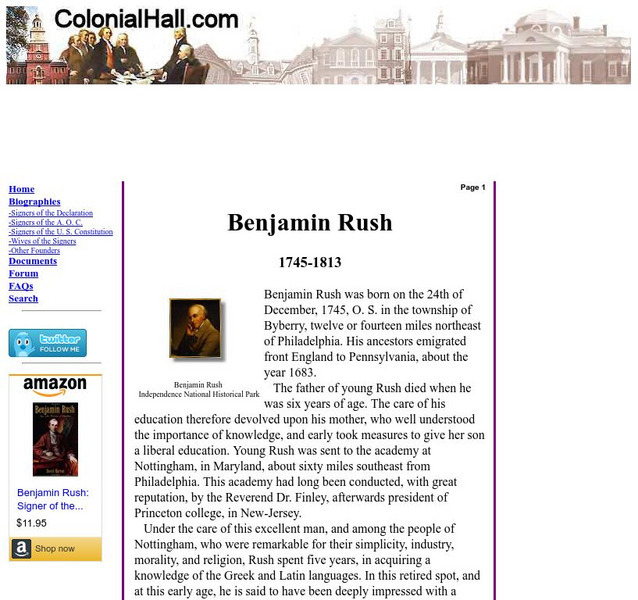Digital History
Digital History: Compromises
Compromise was the name of the game when writing the Constitution. See how taxation, elections, and the power of the federal government were enshrined in the document. Marvel at the ideas that were rejected.
Bill of Rights Institute
Bill of Rights Institute: Elbridge Gerry
Elbridge Gerry is remembered today for his controversial attempt as governor to draw congressional districts in Massachusetts to the advantage of his party. Indeed, "gerrymandering" is a common political tactic today and undeniably part...
Bill of Rights Institute
Bill of Rights Institute: Roger Sherman
Although not the most charismatic or eloquent Founder, Roger Sherman was highly esteemed by his contemporaries. At Sherman's death, Ezra Stiles, president of Yale College, wrote, "He was an extraordinary man-a venerable uncorrupted...
Bill of Rights Institute
Bill of Rights Institute: George Mason
George Mason's ideas helped to shape the Founding documents of the United States, but few Americans remember him today. The words he used when writing the Virginia Declaration of Rights and the Virginia Constitution of 1776 inspired the...
Bill of Rights Institute
Bill of Rights Institute: Additional Amendments
The Constitution contains within itself the process of changing it. The amendment process is described in Article 5. Amendments can be proposed in Congress when 2/3rd of both Houses agree. The states can play a role in proposing changes...
Khan Academy
Khan Academy: Us History: 1754 1800: The Federalist Papers
In the Federalist Papers, Alexander Hamilton, James Madison and John Jay made the case for ratifying the new US Constitution.
Khan Academy
Khan Academy: Us History: 1754 1800: The Bill of Rights
The first ten amendments to the US Constitution guarantee citizens' essential freedoms and rights.
Library of Congress
Loc: Religion and the Founding of American Rep.: Religion and the Federal Gov
This site from the Library of Congress presents selections of articles, writings, and pictures that summarize the beliefs of the early American politicians that morality and personal independence were essential for the country. Links to...
Library of Congress
Loc: Primary Documents in American History: The Articles of Confederation
The original Articles of Confederation and Perpetual Union between thirteen states, created in 1777 and ratified in 1781. It preceded the Constitutional Convention in 1787.
Texas State Library and Archives Commission
Texas State Library and Archives Commission: Forever Free: The 1860s: 19th Century African American Legislators of Texas
An exhibit from the Texas State Library exploring the political achievements of African-Americans in the Texas state legislature and Constitutional Convention from 1865 through the 1890s.
Library of Congress
Loc: American Memory: George Washington to James Madison, 1787
Read George Washington's observations of the delegates, particularly the Anti-Federalists, at the Constitutional Convention, and the objections the opposition presented, which Washington cites in the letter. View an image of the original...
University of Groningen
American History: Outlines: Benjamin Franklin's Rising Sun
Franklin, as the oldest delegate to the Constitutional Convention, recognized the arguments against the proposed new government and the strength of the Federalists. The essay gives insight into Franklin's views on the drafted...
Yale University
Avalon Project: The Federalist Papers
With this resource, you can search by keyword for particular subjects within the Federalist Papers, or you can access by number each of the Papers. Also available are links to four related documents: The Annapolis Convention, Articles of...
Gilder Lehrman Institute of American History
Gilder Lehrman Institute: Age of Jefferson and Madison
[Free Registration/Login Required] After a brief description of Thomas Jefferson's and James Madison's contributions to the early ideology and government of the new United States in their authorship of the Declaration of Independence and...
Stanford University
Sheg: Reading Like a Historian: Federalists & Anti Federalists
[Free Registration/Login Required] Students solve a problem surrounding a historical question by reading primary source documents. This historical inquiry lesson plan allows students to read Federalist and Anti-Federalist positions from...
Khan Academy
Khan Academy: Challenges of the Articles of Confederation
This resource from Khan Academy provides a study resource about the weaknesses of the Articles of Confederation, Shay's Rebellion, and the needed call for a new Constitution. These questions are intended for students taking high school...
US Senate
Vice Presidents of the United States: Elbridge Gerry
A very nice biography of the fifth vice president of the United States, Elbridge Gerry. Gerry died in office in 1814.
US National Archives
Our Documents: Virginia Plan (1787)
Read the complete text of the Virginia Plan that proposed a strong central government consisting of three branches. You can also view images of the original drafts.
US National Archives
National Archives: Congress Creates the Bill of Rights I
This is the first PDF in a four-part series on the Bill of Rights. This part focuses on the history and chronology of the passage of the Bill of Rights. Vivid pictures, primary source documents, and a timeline are provided. [PDF]
Other
Colonial Hall: Benjamin Rush (1745 1813)
This non-profit site offers detailed biography of Benjamin Rush. the United States. Examines his early training, his years in Europe, his work in medicine, his role in the Revolutionary War, and his political career. Rest of site has...
Gilder Lehrman Institute of American History
Gilder Lehrman Institute: Alexander Hamilton: The Man Who Made Modern America
[Free Registration/Login Required] A marvelous look at the life of Alexander Hamilton shown through primary documents in this interactive site.
iCivics
I Civics: The Federalist Debate
The ratification debate between the Federalists and Anti-Federalists gives us insight into the ideas behind both sides and a better understanding of how our government developed in its early years.
Internet History Sourcebooks Project
Fordham University: Modern History Sourcebook: American Independence
Part of Fordham University's Internet Modern History Sourcebook, this site gives historical background and extensive web resources on American Independence.




